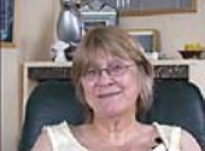Sarah - Interview 27

In 2002 Sarah took part in a clinical trial were she was first diagnosed with osteoporosis. It seems that her diagnosis wasn't sent to her GP. In 2008 she fell and hurt her back and her GP sent her for an x-ray and it was then that her condition was officially diagnosed. Current treatment' alendronic acid once weekly and calcium tablets.
Retired NHS ward clerk, married. Sarah had an early menopause at the age of forty-two and a hysterectomy. Nationality/ethnic background: white British
More about me...
In late 2007 Sarah had another fall and landed on her back but weeks after the accident she was still experiencing pain. She went to see her GP and he sent her to have an x-ray. It was at that point, in January 2008 that she was ‘officially’ diagnosed with having osteoporosis. Her GP prescribed alendronic acid once weekly and calcium tablets.
Sarah had several years delay before she started taking medication because during a clinical trial her diagnosis was not sent to her GP.
Sarah had several years delay before she started taking medication because during a clinical trial her diagnosis was not sent to her GP.
Sarah enjoyed hydrotherapy. After her last physiotherapy session the back of her hand has been numb.
Sarah enjoyed hydrotherapy. After her last physiotherapy session the back of her hand has been numb.
Sarah finds it very uncomfortable to travel on some trains.
Sarah finds it very uncomfortable to travel on some trains.
Sarah thinks that it is her lack of exercise rather than her diet that has contributed to her weight gain.
Sarah thinks that it is her lack of exercise rather than her diet that has contributed to her weight gain.
Yes, I have. Because clothes that I had two years ago I can’t wear now. I’ve gone up to size 18. Bit depressing.
No, I haven’t made any changes.
Sarah feels bitter that she has lost six years of treatment after the results of her DXA scan were misplaced.
Sarah feels bitter that she has lost six years of treatment after the results of her DXA scan were misplaced.
Sarah needs a comfy chair to sit in when she is at social activities otherwise she could not sit still for very long.
Sarah needs a comfy chair to sit in when she is at social activities otherwise she could not sit still for very long.

